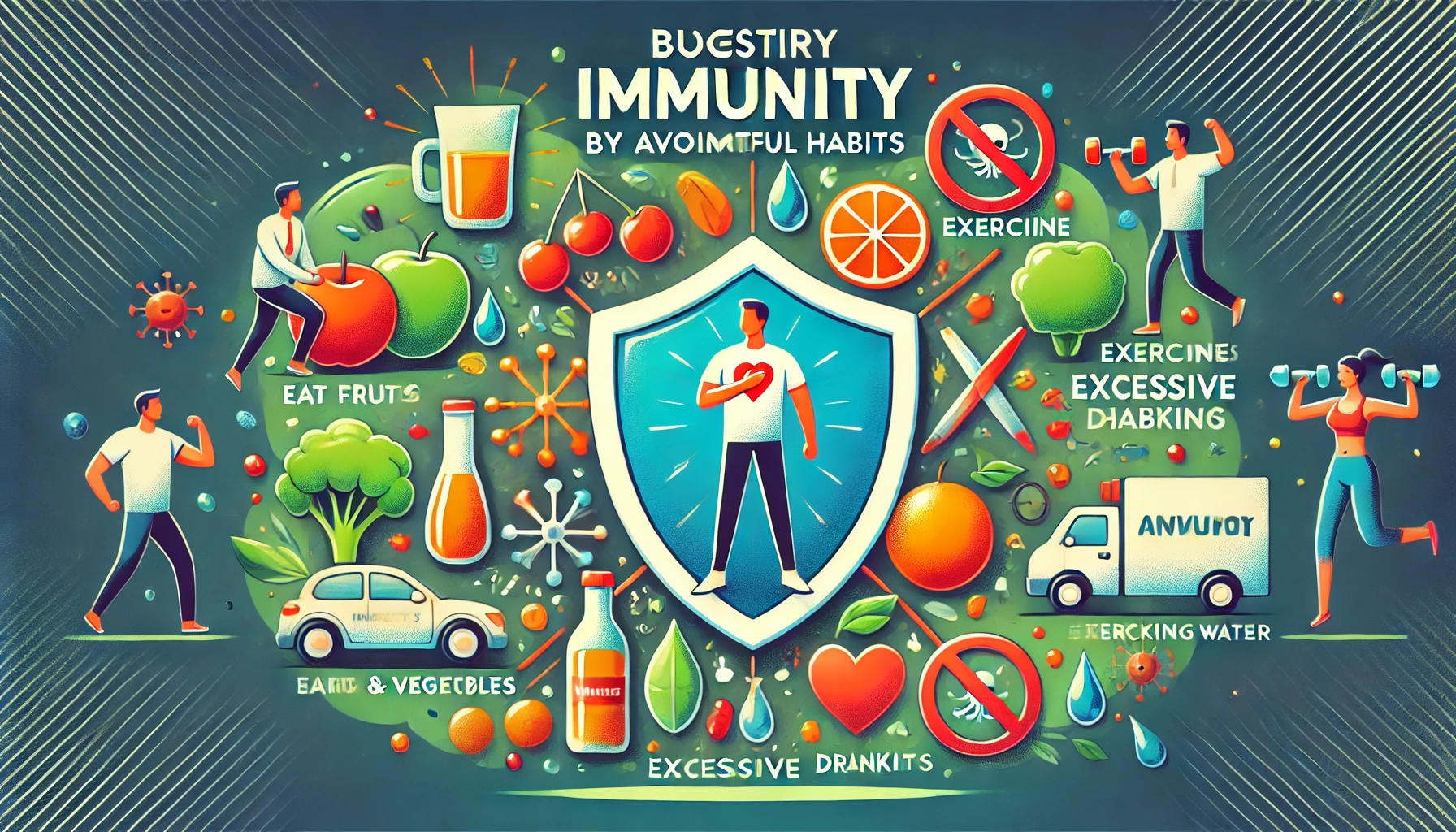A strong immune system protects the body from infections and diseases. While some factors that affect immunity are beyond control, like age or genetics, you can boost your immune system naturally by making smart lifestyle choices and avoiding harmful habits. These choices include eating a balanced diet, staying hydrated, managing stress, and adopting healthier alternatives to certain habits.
In this blog, we’ll discuss how avoiding harmful habits such as excessive alcohol consumption and poor dietary choices can strengthen your immune system and improve your overall well-being.
1. Hydration is Key to Immunity
Hydration is one of the simplest yet most effective ways to support your immune system. Water plays a crucial role in maintaining bodily functions, including the circulation of immune cells, nutrient absorption, and the elimination of toxins. Without proper hydration, your body struggles to perform these essential functions, which can weaken your immune system over time.
Drinking enough water also keeps the mucous membranes in your respiratory system moist, creating a protective barrier against viruses and bacteria. For boosting your immune system naturally, start by drinking at least eight glasses of water a day. This habit will not only improve your immunity but also promote overall health.
2. Eat a Balanced Diet Rich in Nutrients
Your diet has a direct impact on your immune health. By avoiding processed foods and focusing on whole, nutrient-dense meals, you can give your immune system the fuel it needs to function properly. Foods rich in antioxidants, vitamins, and minerals help your body fight off infections and inflammation.
- Vitamin C: Found in citrus fruits, bell peppers, and broccoli, vitamin C boosts immune cell function and helps the body fight off infections.
- Zinc: This essential mineral, present in foods like nuts, seeds, and legumes, helps support immune cell development.
- Antioxidants: Foods such as berries, leafy greens, and nuts contain antioxidants that protect the immune system from oxidative stress and free radicals.
Eating a balanced diet is one of the most powerful steps toward boosting the immune system naturally. Avoiding excessive sugar, processed foods, and unhealthy fats can reduce inflammation and make your body more resilient to infections.
3. Avoid Excessive Alcohol Consumption
Alcohol is a common harmful habit that many people overlook when thinking about their health. However, excessive alcohol consumption can severely compromise your immune system by impairing the body’s ability to fight off infections. Alcohol weakens immune cells, making you more susceptible to illnesses such as the common cold, flu, and even more serious conditions.
If you’re struggling with alcohol consumption and its impact on your health, it’s essential to learn how to quit. By quitting alcohol, you give your immune system a much-needed boost. You can learn more about quitting alcohol by visiting How To Stop Drinking Alcohol Permanently. Taking this step will not only improve your immune function but also your mental and physical well-being.
4. Get Regular Exercise
Physical activity is another excellent way to boost your immune system naturally. Regular exercise promotes healthy circulation, which helps the immune cells and other essential molecules reach different parts of the body. Exercise also reduces inflammation and supports the production of endorphins, which can reduce stress levels.
- Moderate Exercise: Activities like walking, cycling, and swimming for 30 minutes a day can have significant immune-boosting effects.
- Strength Training: Incorporating strength training a few times a week helps build muscle, strengthen bones, and reduce the risk of illness.
However, avoid over-exercising or pushing yourself too hard, as excessive physical stress can weaken your immune system. Instead, maintain a consistent routine that balances cardio, strength training, and rest.
5. Get Enough Sleep
Sleep is essential for good immune function. During sleep, the body produces and releases proteins called cytokines, which help fight infection and inflammation. Without adequate sleep, your body may not produce enough of these important proteins, leading to a weakened immune response.
Make sleep a priority to help boost your immune system naturally. Aim for 7-9 hours of quality sleep each night. Creating a consistent bedtime routine, avoiding caffeine late in the day, and reducing screen time before bed can all improve your sleep quality.
6. Manage Stress Effectively
Chronic stress can weaken the immune system and increase your susceptibility to illnesses. When the body experiences stress, it releases cortisol, a hormone that can suppress immune function. Over time, high cortisol levels can leave you vulnerable to infections and diseases.
Managing stress through techniques like meditation, deep breathing, or yoga can support your immune system and overall health. Incorporating mindfulness practices into your daily routine can also reduce the negative impact of stress on your body. By managing stress, you’ll be boosting your immune system naturally and protecting yourself from the harmful effects of chronic tension.
7. Quit Smoking
Smoking is a harmful habit that significantly weakens the immune system. The toxins in cigarettes impair lung function and damage immune cells, making it harder for the body to fight off respiratory infections like pneumonia and bronchitis. Smoking also increases the risk of autoimmune diseases and reduces the effectiveness of vaccinations.
Quitting smoking is one of the most important steps you can take to improve your immune system naturally. If you’re struggling to quit, seek support from healthcare providers or support groups to make the process easier. In the long run, your immune system will thank you.
8. Prioritize Gut Health
Your gut houses nearly 70% of your immune system, making gut health essential for a strong immune response. Avoiding harmful foods like processed snacks, refined sugars, and artificial additives can protect your gut from inflammation. Instead, focus on nourishing your gut with probiotic-rich foods like yogurt, kefir, and sauerkraut.
Eating fiber-rich foods such as whole grains, fruits, and vegetables also supports the growth of healthy gut bacteria. By taking care of your gut, you’re boosting your immune system naturally, as a healthy gut contributes to stronger immune defenses.
9. Maintain Good Hygiene
Practicing good hygiene is a simple yet effective way to support your immune system. Washing your hands regularly helps prevent the spread of germs and reduces your chances of getting sick. Personal hygiene, such as brushing your teeth and showering regularly, also plays a role in protecting your body from harmful bacteria and viruses.
Make it a habit to wash your hands for at least 20 seconds before eating or after coming into contact with potentially contaminated surfaces. Good hygiene practices act as a first line of defense for your immune system.
10. Surround Yourself with Positivity
Mental health and emotional well-being have a significant impact on physical health, including immune function. Surrounding yourself with positive influences, whether through relationships, activities, or hobbies, can reduce stress and improve your overall outlook on life. Maintaining strong social connections and participating in activities you enjoy can also contribute to better mental and physical health.
Nurturing a positive mindset and fostering healthy relationships can create an environment that supports your immune system. You’ll find that boosting your immune system naturally involves not only physical habits but also a healthy emotional environment.
Conclusion
Boosting your immune system naturally requires consistency and dedication, but the results are well worth the effort. By avoiding harmful habits such as excessive alcohol consumption, smoking, and poor dietary choices, you can strengthen your body’s defenses and improve your overall health.



